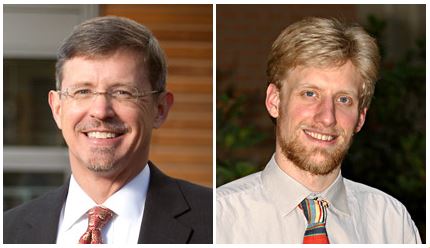Dodge and Elmendorf Publish in Columbia Law Review
The December issue of the Columbia Law Review is out, and two of its scholarly articles come from King Hall faculty: William S. Dodge and Christopher S. Elmendorf.

Professor Dodge's article is International Comity in American Law. Abstract: "International comity is one of the principal foundations of U.S. foreign relations law. The doctrines of American law that mediate the relationship between the U.S. legal system and those of other nations are nearly all manifestations of international comity-from the conflict of laws to the presumption against extraterritoriality; from the recognition of foreign judgments to the doctrines limiting adjudicative jurisdiction in international cases; and from a foreign government's privilege of bringing suit in the U.S. courts to the doctrines of foreign sovereign immunity. Yet international comity remains poorly understood. This Article provides the first comprehensive account of international comity in American law. It has three goals: (1) to offer a better definition of international comity and a framework for analyzing its manifestations in American law; (2) to explain the relationship between international comity and international law; and (3) to challenge the myths that international comity doctrines must take the form of standards rather than rules and that international comity determinations should be left to the executive branch."
Professor Elmendorf's article (with Douglas M. Spencer) is Administering Section 2 of the Voting Rights Act After Shelby County. Abstract: "Until the Supreme Court put an end to it in Shelby County v. Holder, section 5 of the Voting Rights Act was widely regarded as an effective, low-cost tool for blocking potentially discriminatory changes to election laws and administrative practices. The provision the Supreme Court left standing, section 2, is generally seen as expensive, cumbersome, and almost wholly ineffective at blocking changes before they take effect. This Article argues that the courts, in partnership with the Department of Justice, could reform section 2 so that it fills much of the gap left by the Supreme Court's evisceration of section 5. The proposed reformation of section 2 rests on two insights: first, that national survey data often contains as much or more information than precinct-level vote margins about the core factual matters in section 2 cases; and second, that the courts have authority to regularize section 2 adjudication by creating rebuttable presumptions. Most section 2 cases currently turn on costly, case-specific estimates of voter preferences generated from precinct-level vote totals and demographic information. Judicial decisions provide little guidance about how future cases - each relying on data from a different set of elections - are likely to be resolved. By creating evidentiary presumptions whose application in any given case would be determined using national survey data and a common statistical model, the courts could greatly reduce the cost and uncertainty of section 2 litigation. This approach would also reduce the dependence of vote dilution claims on often-unreliable techniques of ecological inference and would make coalitional claims brought jointly by two or more minority groups much easier to litigate."
Congratulations on these prestigious placements, Professors Dodge and Elmendorf!
